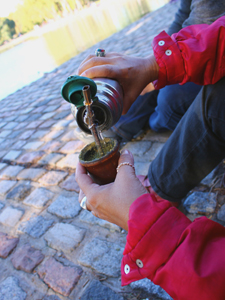Put the Boom in Your Brainstorm



It's back-to-school time, and studying is hard.
Abominable.
Frustrating.
And a whole list of other not-so-nice words.
Is there anything to make it bearable?
Even... possibly... fun?
First, let's try sencha. Besides the plethora of puns presented upon acquaintance ("Hey there sweetcheeks, you must be an angel—'cause I can tell Heaven sencha."), this green tea is prized for its ability to blast your brainpower. It's not by accident—a shade-grown green tea will have a higher amino acid profile, as the growing plants hoard what little nutrients they can squeeze from the abbreviated sun exposure.
Since neurotransmitters are comprised of amino acids, this is a case of the more, the merrier. An increased supply of aminos in a tea increases the amount of potential brain-boosters floating in your cup. David Asprey, aka the Bulletproof Executive, swears by it. One can only deduce that sencha brings you one sip closer to the charismatic lifehacker/entrepreneur that you always wished you could be.
Also, sencha is the most student-friendly option for your budget. It's not as pricey as some other shade-grown greens, like its imperial cousin, Gyokuro. However, if you have the cash to spare, then Gyokuro is a worthy investment for the amino content alone, thanks to super-stringent growing conditions and a host of other antioxidants coming into play.
It's super tasty, too. (Picture all the green veggies. All of them.) A quick, 1-minute steep in freshly simmered water is all it takes.
Then there's yerba mate. Timothy Ferris—self-professed "human experiment", author of the 4-Hour Work Week and its buddy, the 4-Hour Body—puts his faith in this little holly plant from South America.
Boom, aminos.
Boom, theobromine.
Boom, theophylline.
Boom, caffeine up the wazoo.
By their powers combined, these xanthine alkaloids impart wicked brain function, stimulating neurotransmitters for a feeling of wakeful zen. Ferris claims that mate's particular combination of xanthines is optimal for his creative writing process—something that may come in handy during finals week.
Flavor-wise, heads up if you've got a persnickety sweet tooth. Mate tastes a bit like sencha that gave up on itself, ending up quite bitter if left to its own devices. Steep for 2 minutes max with boiling water, 3 minutes if you're daring. If you've really gotten hooked, grab a gourd and bombilla for the full experience.
And before we forget, rosemary! This herb is devoid of caffeine, and has been used for centuries to promote memory and cognition.
Sound familiar? See if you can remember the famous nod to rosemary in Shakespeare's Hamlet: "There's rosemary, that's for remembrance," plies Ophelia. "Pray, love, remember."
Even before Shakespeare's time, the ancient Greeks used rosemary to revitalize the senses and improve their powers of recollection—useful for memorizing epic poetry, or an epic PowerPoint presentation. This is due to rosmarinic acid, which contains antioxidants that engage the central nervous system for increased neural activity. Sweet.
Ladies take heed, however: rosemary in excess can mess with hormone function. It's also a feisty little appetite stimulant, so be aware how much you're using for a tea. Just one teaspoon in boiling-hot water should do the trick, and a 5-10 minute steep.
Y'know, that 5-10 minute steep might be the perfect time to take a study break.
Cheers.
